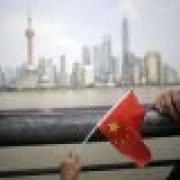Why China doesn't want to be number one
According to the World Bank, Chinese GDP in purchasing power parity terms will surpass that of the US to become number one in the world late this year. But the Chinese government has clearly stated that it has ‘reservations’ about the World Bank’s methodology and ‘did not agree to publish the headline results for China’.
Chinese leaders understand that no matter how large the country’s GDP or GDP in purchasing power parity terms is, China’s 1.4 billion people -- the largest national population in the world -- will dilute its real power. For example, in 2012 China’s GDP per capita was ranked 91st according to the World Bank, even behind that of Iraq, whose economy was still suffering from the consequences of the US-led invasion. Adjusting for purchasing power parity would have moved China up to 89th, still behind the Dominican Republic.
Moreover, China’s military budget is still less than one third of that of the US, although China has tried to keep its military spending up with a two-digit increase in recent years. In terms of soft power (its ideational and normative influence in the world) China’s power is still small in comparison with the US. In his new book, China Goes Global: The Partial Power, leading China scholar David Shambaugh systematically examines China’s multifaceted influences in today’s world politics. He concludes that China is still not a true global power but is a "partial power".
China’s reservations about claiming the ‘number-one world economy’ title stem from a desire to avoid falling into another rhetorical trap. In 2005, Robert Zoellick, then US deputy secretary of state, proposed that China play the role of ‘responsible stakeholder’ in shaping the international agenda. In the eyes of Chinese leaders, Zoellick’s proposal was a ‘rhetorical trap’, which aims to dictate and constrain China’s foreign policy behaviour — encouraging criticism of China if it fails to fulfil the role.
Another fear is burgeoning nationalism, which could be fuelled by China’s number-one status in the world economy. Chinese leaders are not shy about their strategic goal of becoming a ‘great power’, the so-called ‘great rejuvenation of the Chinese nation’ in Xi Jinping’s ‘China Dream’. Nationalism (the preferred term is ‘patriotism’ in China) has become a useful political tool for the Chinese Communist Party to sure up its support.
But nationalism is a double-edged sword in any country. For example, during the current maritime disputes between China and Vietnam as well as between China and the Philippines in the South China Sea, Chinese internet users publicly questioned the Chinese government over its weakness in protecting national interests in the South China Sea.
It is not difficult to imagine that if China celebrates its new status as the world’s number-one economy, then there will be more questions and pressures on the Chinese government.
Still, many see China’s rejection of its possible number-one status as further shirking responsibilities to which it should be obligated. For example, China still insists on its status as a developing country in negotiations to reduce greenhouse gas emissions. It is true that if we consider its huge population, China is and will be a developing country for a long time. However, with its current economic growth rate, China will eventually overtake the US as the largest economy.
It may be too early for China to think about how to lead the world, but keeping peace with its neighbours through rules and norms is an important aspect of world leadership. Signing a code of conduct in the South China Sea may be the first step for China to set up the rules in alleviating the South China Sea disputes. China cannot become a world leader if it continues to quarrel over rocks and islets in the South China Sea -- no matter whether it is number one or not.
Originally published at East Asia Forum. Reproduced with permission.
















